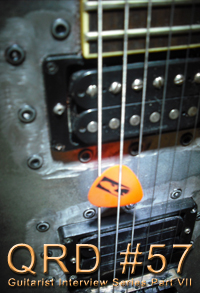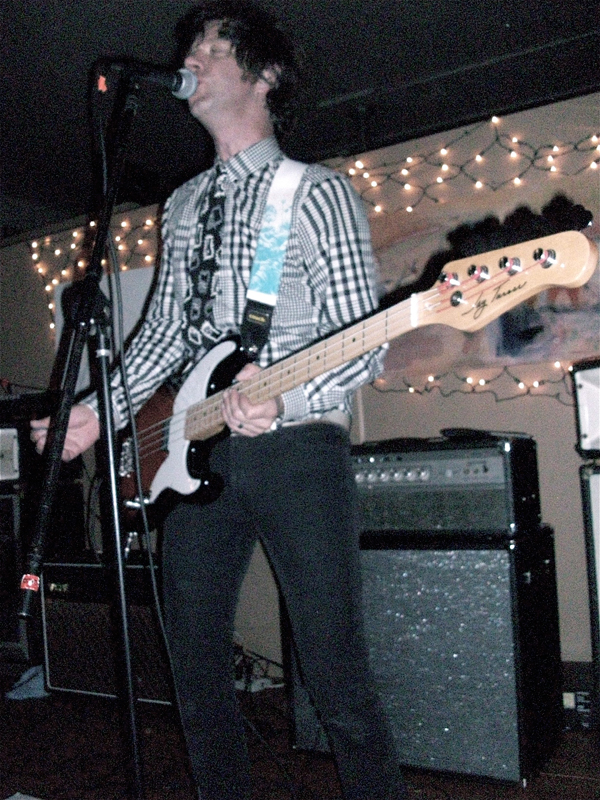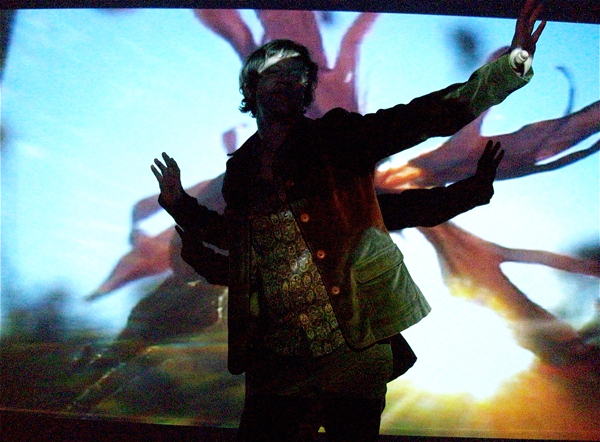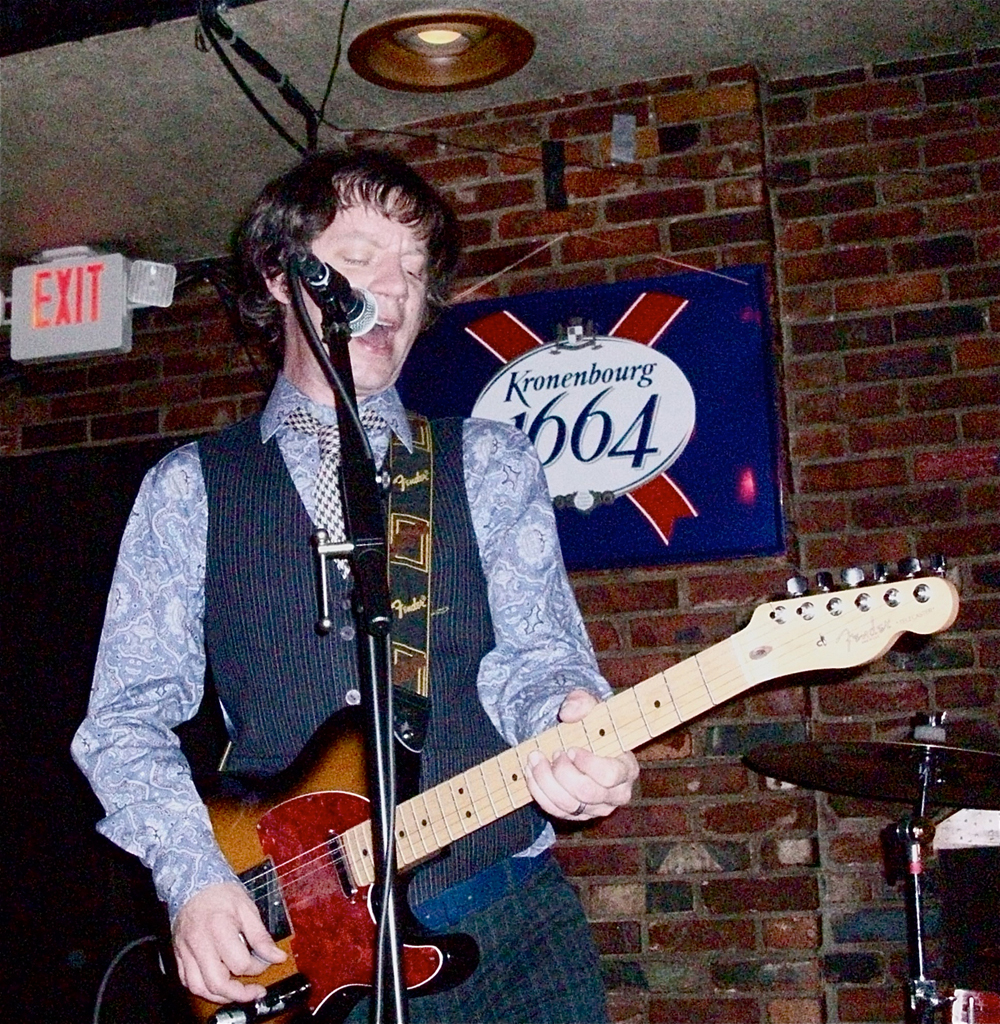
 |
| about
this issue
Guitarist Interviews with: Francesco Candura Justin O’Connor C Joynes Brandon W Pittman Killick Hinds Kyle Arthur Miller Mark Wol Dan West Olaf Rupp Lorne Hind Mark Nelsen Jordan Ferreira Willy B Andrè Erbyeah Shane Handal Interview Series Updates: Andras Fekete Martin Newman |
 |
 |
 |
 |
 |
 |
|
|
                      |
January 2013

Bands: Sidewalk Society (bassist, vocalist), LoveyDove (bassist, guitarist, vocalist), Aguafantastica (guitarist, vocalist), Dan West (multi-instrumentalist), D. Morgan West (multi-instrumentalist)
Websites: Sidewalk Society - http://sidewalksociety.wordpress.com/, LoveyDove - https://soundcloud.com/loveydove, Dan West - https://soundcloud.com/dubsonic-2
http://danwest.bandcamp.com/
Listen to “The Valleys Gone" by Dan West
QRD – What was your first guitar & what happened to it?
Dan – Sears, Teisco Del Rey: Eventually was destroyed when I “Pete Townshend” it at a gig at North Hollywood high school. I had a Fender Telecaster & a Rickenbacker 360 12 string by that time & felt I could sacrifice the not so dear old Teisco which, by the 5th fret, had the strings up at least a quarter of an inch above the fingerboard. It was torture to play bar chords on that thing (!); although, it did strengthen my fingers & make it generally much easier to play a well set up, professional model guitar when I finally got one.
QRD – What’s your typical set-up from guitar to effects to amplifier?
Dan – My guitar set up consists usually of a Fender 1960 re-issue Telecaster run through a modified RAT overdrive, a BOSS delay/harmonizer, & a Line6 Leslie simulator pedal, into a silverface 1970s Fender Twin. My bass set up consists of one of 2 matching Jay Turser 1953 Precision bass re-issues into a 1970 Ampeg V4 or V4B head with matching single 15 cabinet.
QRD – What’s the most important part of your rig – guitar, amplifier, or effects?
Dan – All aspects, guitar, pedals, & amplification are important.
QRD – What’s your main amplifier & why?
Dan – The Fender Twin for guitar & the reason being is it’s sheer clarity & the ability to remain clear when more gain is needed. I do love the Vox AC30 for its gain structure & the fact its mid-range can really growl, but I don’t currently own one. My guitar sound is deeply influenced by the 1960’s/1970’s pantheon of guitar players so, in both cases, those amps were used most often in the studio with the early Marshall & Sound City amps for the wide open, large performance spaces. The V4 & V4B for bass are the 100 watt version of the SVT heads which are 300 watts & weigh a ton; so, unless I am playing a large venue, are a bit overkill. The V4s give me plenty of headroom before breakup & I like the clean twang of John Entwistle; especially in Sidewalk Society, which is a very Who/Small Faces influenced band that I currently perform & record with.
QRD – What’s your main guitar & what are the features that make it such?
Dan – It has been & will always be the Fender Telecaster. In my opinion, it is the most versatile guitar ever designed. My music, in particular, covers many stylistic influences from rock, to jazz, to country & the Tele does it all!
QRD – If you had a signature guitar, what would it look like & what would some of its features be?
Dan – It would be a Tele with possibly the addition of a whammy bar & the Curtis Novak 4 position, toggle switch mod. Not very creative I realize, but I’m pretty utilitarian when it comes to a guitar or bass. It’s the sound & feel that concerns me most, although I do have a real problem with guitars in day-glow colours! Give me a blonde, cherry, or tobacco sunburst, & I’m fine.
QRD – If you had a signature pedal, what would it be & what would some of its features be?
Dan – I would love a pedal that combines all forms of overdrive, from amp gain type overdrive to broken up fuzz. Basically, just a black rectangular box with 5 or 6 buttons for each type of drive & 3 knobs to control input gain, output gain, & tone for each.
QRD – How many guitars do you own?
Dan – I own 4 guitars & 3 basses.
QRD – How & where do you store your guitars?
Dan – I keep them all in cases standing in a row against one of my studio walls.
QRD – What do you wish guitar cases had that they usually don’t?
Dan – A convenient & non-intrusive place for the strap!
QRD – What features do you look for when buying a guitar?
Dan – Ease of playability i.e. the “set up.” How the fingerboard feels, the body feels, & most importantly - the sound. No two guitars of the same manufacturer or model ever sound exactly the same; so when I go to purchase a guitar, I will play many of the theoretically “same” guitars to find the one that has, as close as possible, all of these elements in one package.
QRD – How much do you think a good guitar should cost?
Dan – No more than seven or eight hundred dollars. The vintage guitar market has gotten absolutely ridiculous in the last 15-20 years with guitars in the tens of thousands of dollars. The only people who own those now are doctors & lawyers who may not even play more than a couple of open chords & these are instruments that should be played by real players. Not all great players make such great money in this business so the
$30,000 1966 Telecaster or Stratocaster is out of the question unless extreme luck or
Ebay savvy is involved.
QRD – Do you upgrade & customize your guitars or just stick with what you get?
Dan – I don’t mod too much. Generally I’ll replace parts if they go bad; but if it sounds good when I get it, why mess with it.
QRD – How thoroughly do you research or test a piece of equipment before buying it?
Dan – Well, the answer to that question is thank God there is an internet. The only problem though is that ultimately, the only way to really rate an instrument for yourself is to actually touch, feel, & play it. Also, there are so many forums & opinions on the web; it’s easy to be overwhelmed by a lot of BS. This is why I only have a few electrics. I figure I’ve got what I need so why take up creative time getting too obsessed over owning everything. That being said, there are a few more guitars I’d like to own before I leave the planet, but I usually wait until someone I know is selling something of interest or Craigslist & then follow up with technical & pricing research on the web. I would stay away from buying a guitar on Ebay unless it is really rare or a quirky instrument.
QRD – Do you change your rig around often?
Dan – No. If it ain’t broke, don’t fix it. The only time I would go against this would be in the case of needing a bigger amp for more volume or swapping out a speaker for a different sound. Guitars I tend to leave alone as much as possible.
QRD – Are you after one particular guitar tone & locking into it, or do you like to change your tone around a lot?
Dan – I will experiment occasionally if I’m looking for a specific sound for a recording, but generally I stick to the sounds I know work for the styles of music I compose & play.
QRD – What are some guitars, amps, & pedals you particularly lust after?
Dan – The uber expensive, highly coveted Fender VI bass & both a 1968 & 1972 Telecaster Thinline which are both, currently, way out of my price range.
QRD – What do you think are some important features to be on a person’s first guitar that aren’t always there?
Dan – A good set up. Easy playability & solid intonation. A lot of the beginner series guitars from Squire (Fender budget line) look cool, but are pieces of crap from the perspective of being easy to play & sounding halfway decent.
QRD – What have been the best & worst guitar related purchases you’ve made?
Dan – Best purchase: my current Fender Tele; worst purchase: a Washburn with the Buzz Feiten tuning system. I could never get that guitar in tune!
QRD – What are some effect, amp, & guitar brands you particularly like or dis-like & why?
Dan – I love Fender & although I respect Gibson & love the sounds of those guitars, the neck & overall scaling doesn’t appeal to me. Gibsons always feel body heavy (Les Paul) or neck heavy (SG). There are a bunch of boutique pedal manufactures that are doing great work. One site is Build Your Own Clone (http://buildyourownclone.com) which have an array of classic pedals that sound killer. They send you the parts & then you do the basic assembly. The stuff I don’t like is too numerous to get into here!
QRD – What’s the first thing you play when you pick up a guitar?
Dan – A few blues licks in A & then a series of triads up & down the neck to get a feel of what’s going on with the particular instrument I’m playing.
QRD – How old were you when you started playing guitar?
Dan – 7 years old.
QRD – At what age do you think you leveled up to your best guitar playing?
Dan – Early 20s.
QRD – Why do you think a guitar fits you more so than other instruments?
Dan – Well, I love playing piano as well; but a guitar, especially in rock music, is the universal voice - plus I can take it anywhere!
QRD – Do you think guitar should be people’s first instrument as often as it is?
Dan – No. I think piano should be the first instrument, then guitar. However, so many great guitar players never really spent any time on the piano, that that’s ultimately just my opinion. The reason I say that though, is because I believe that the fundamentals of music are so much easier to understand on the piano than a guitar in the early stages of learning music & basic music theory. Learning the basics of music theory on a guitar is the equivalent of trying to learn the basics of math on a Rubik’s cube. The guitar by the very nature of its layout as an instrument, is a puzzle; the piano is much more straightforward & laid out right in front of you in an intuitive way.
QRD – Do you see your guitar as your ally or adversary in making music?
Dan – Ally.
QRD – Who are the guitarists that most influenced your playing & sound?
Dan – Guitarists: Pete Townshend, Lenny Breau, Ted Greene, Syd Barrett, Jimi Hendrix, Edward Van Halen, Wes Montgomery.
Bassists: John Entwistle, Paul McCartney, James Jamerson, Scott LaFaro.
QRD – Do you think people anthropomorphizing their guitars is natural or silly (e.g. naming their guitar)?
Dan – I don’t condemn naming your guitar, but I don’t do it. I do though, refer to them in the female gender.
QRD – What’s the most physical damage you’ve done to a guitar & how did you do it?
Dan – The aforementioned Teisco was reduced to scrap wood & the shop teacher at the high school threatened to make me pay for a new stage in the school auditorium. I got so carried away I took chunks of wood out of that stage! The kids loved it though & it was a great release of pent up adolescent frustration for me.
QRD – What do you do to practice other than simply playing?
Dan – I run basic scales & chord shapes with a metronome, but most of the time all technique comes from just playing gigs & recording.
QRD – How many hours a week do you play guitar & how many hours would you like to?
Dan – If I could, I’d play 24 hours a day, but usually anywhere from 2-3 hours a day.
QRD – What type of pick do you use & why?
Dan – Standard Fender heavy. I feel I have the most control when I can play more lightly & let the pick do more of the work. This approach equals far less fatigue for my hand & wrist.
QRD – What gauge strings do you use & why?
Dan – Standard “slinky” gauge; 10 on the high E, 46 for the low E. I was also using the “light top/heavy bottom” arrangement for a while which still has the slinky gauges for the top 3 strings & heavier than slinky gauges for the bottom 3 strings. The low E is 52 gauge if I remember correctly.
QRD – How often do you change strings?
Dan – Once maybe twice a year. If I’m on a tour though, I will change them more often.
QRD – How often do you break strings?
Dan – Rarely. My technique has settled in to where I don’t break strings that much.
QRD – Which do you feel is more proficient, your strumming hand or fretting hand & how does that effect your style?
Dan – My fretting hand is far more proficient. I’ve had to do a lot of work to control my strumming/picking hand. I tend to go overboard with the strumming/picking & have had to work to calm that aspect of my playing down.
QRD – Do you set-up your guitar yourself or send it to a guitar tech (or not set it up at all) & why?
Dan – I always set up my guitars. Sometimes I’ll do tweaks on my own, but I prefer to give it to an experienced technician to deal with the truss rod & the finer aspects of set up.
QRD – What tunings do you use & why?
Dan – I’ve used a lot of different tunings. In the 90’s, I experimented greatly with open tunings & drop tunings, but sometime 10 years ago I came back to standard with only the occasional drop D tuning for certain songs.
QRD – Do you prefer tablature, sheet music, or some other notation system for writing down your own ideas?
Dan – For chords I prefer the block diagram. For single notes, a combination of standard notation & tablature. Most of the time, I just record my ideas. My ears are pretty adept at being able to decipher what I’ve played in past recordings; so when the time comes to re-create a guitar part from a recording for live performance, I don’t have too much of a struggle. A really complicated idea, I will write down in one form or another, but I keep it simple most of the time.
QRD – How high do you hold your guitar when playing (strap length)?
Dan – I don’t know the exact measurement, but I like to wear the guitar so that the center of the back of the body is right over the belt buckle area of my waist. The backs of my guitars unfortunately show proof of this!
QRD – What’s a bad habit in your playing you wish you could break?
Dan – Rushing the tempo. My good friend who is a producer/engineer once said to me, “You have more time than you think.”
QRD – Playing what other instrument do you think can most help someone’s guitar playing?
Dan – Piano.
QRD – What’s a type of guitar playing you wish you could do that you can’t?
Dan – Shred.
QRD – What’s a guitar goal you’ve never accomplished?
Dan – Soloing over up-tempo jazz standards. I can do slow & mid-tempos, but not the fast ones.
QRD – What’s the last guitar trick you learned?
Dan – Sweep arpeggios.
QRD – What’s your favorite guitar gadget (ebow, capo, slide, string cutter, etc)?
Dan – Slide, ebow.
QRD – What’s a guitar technique you’d like to master, but haven’t?
Dan – Bluegrass.
QRD – Did you ever take guitar lessons & if so, what did you learn from them?
Dan – I’ve taken many lessons & have learned much from all of them; especially my studies with Ted Greene (studied 8 years with Ted!), who taught me how to play the guitar more like a piano or like an orchestrator in terms of really understanding the fingerboard & approaches to creative reharmonization of a melody. But overall, Ted taught me how to be a musician.
QRD – What would you teach someone in a guitar lesson that you don’t think they would generally get from a guitar teacher?
Dan – How to “feel” the time or basic rhythm of a song or style.
QRD – What’s something someone would have to do to emulate your style?
Dan – Listen to the musicians that I listen to.
QRD – What’s your take on tremolo systems?
Dan – They are all a pain in the ass in varying ways, but the Floyd Rose has always been solid. I have to admit, I’m not a big expert on that side of the guitar spectrum.
QRD – How often do you adjust your tone knob?
Dan – Hardly ever. I do more of that kind of adjustment on the amp side.
QRD – What do you see as the difference between lead guitar & rhythm guitar players?
Dan – Rhythm guitar players generally have a better vocabulary of chords. Lead players are better with single notes, but aren’t as creative with chords & harmonies. My favorite guitarists can do both equally well.
QRD – If a band has good guitar work, can you ignore the rest of the band not being good?
Dan – No. All parties have to deliver.
QRD – What famous musician’s guitar would you like to own & why?
Dan – I would love one of Ted Greene’s Telecasters. He had them all the way back to the early 50s models, shortly after they became the modern day Telecaster & no longer the Broadcaster.
QRD – Who do you think is currently the most innovative guitar player & why?
Dan – Lionel Loueke. He is bringing all kinds of new sounds & approaches to jazz guitar & guitar in general based on his west African heritage.
QRD – Where can people hear your best guitar work?
Dan – On my songs which are up on Soundcloud, Bandcamp, YouTube et.al.
QRD – Anything else?
Dan – Thank you Brian, for the opportunity to share my thoughts on guitar & guitar playing!
